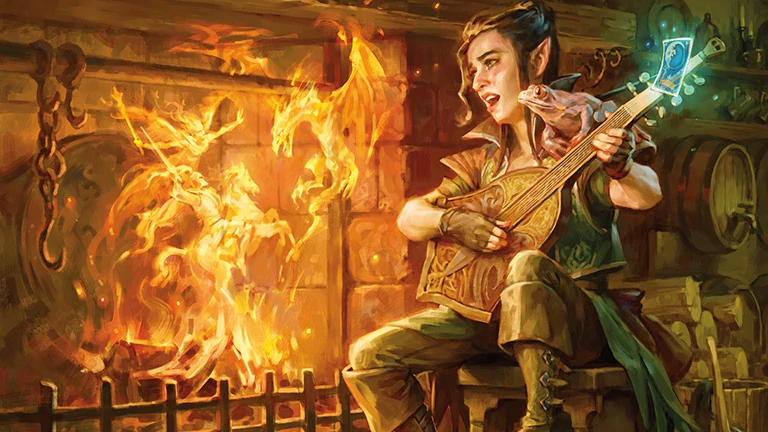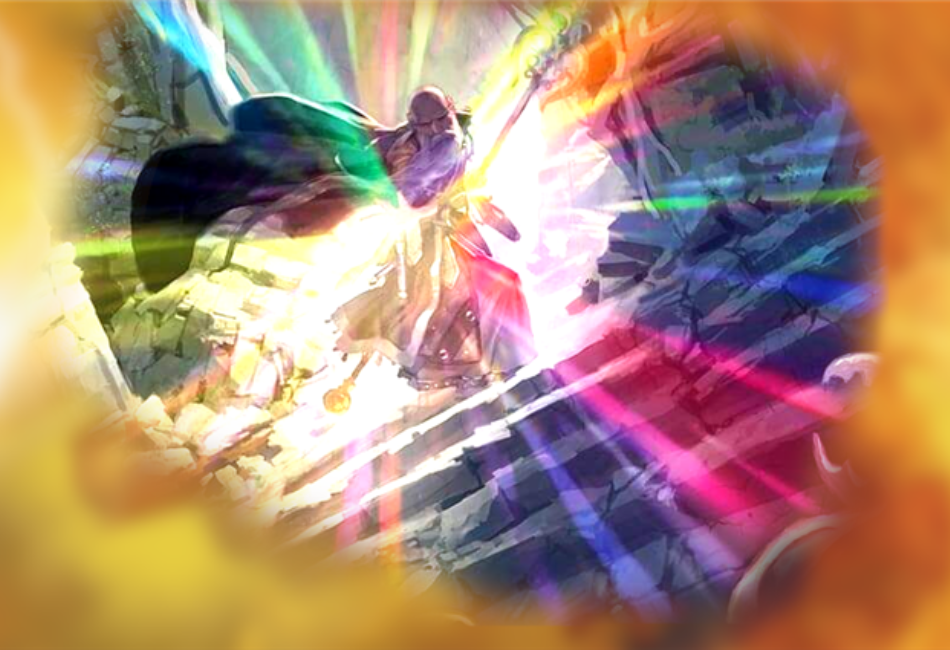A Wish 5e guide is a near necessity for new DMs and players alike. Once players find out that they can use Wish, they are drawn to it like a magnet. I’ve considered making a spellcaster so that I could try it out.
Unfortunately, I typically play Rogue, Ranger, or a homebrew class. I haven’t played a spellcaster in about a decade. If you play a spellcaster or you plan on playing one, then you need to know about Wish.
If you’ve always wanted your own Simurgh or the ability to fully heal your entire team without rolling, then Wish will make your heart swell. The depth of your imagination is your only limit.
Wish Spell in 5e — Abridged
Let’s get down to what you need to know about Wish from 5e if you’re in a hurry. Wish is a 9th-level Conjuration spell that Sorcerers and Wizards can cast. It is an instant-cast spell that requires nothing but your voice.
The concept of the spell Wish is that you wish for anything you can imagine, and it happens. However, unless you choose from a short list of ideas, the DM gets to decide exactly how your Wish is carried out.
There are consequences to casting the spell unless it is used to duplicate another spell. Players who use it for anything else will be weakened for a time and may never be able to use the spell again.
Wish 5e — What Can It Do?
- Unlock: 9th Level Conjuration
- Casting Time: 1 action
- Range: Self
- Target: Self
- Components: V
- Duration: Instantaneous
- Classes: Sorcerer, Wizard

Wish is the strongest spell that a player can cast. In 5e, all you have to do is speak your Wish, and you can alter reality. Even in the Player’s Handbook for 5e, Wish is worded better and in a much more immersive way than previous versions.
What I love about this spell is that instead of limits, there are ideas that the DM will have much more limited discretion on.
Here are the things you can do with Wish in 5e without sole DM discretion.
- Duplicate any 8th-level spell or lower – you don’t need components or prerequisites.
- You conjure one object of up to 25,000 gp in value as long as it’s not magic or larger than 300 feet; the space where you conjure it must not be occupied
- Up to 20 creatures – that you can see – regain all hit points; the spell mirrors the Greater Restoration spell.
- Up to ten creatures – that you can see – gain Resistance to a specified damage type
- Up to ten creatures – that you can see – gain Immunity to a single spell – or magical effect – for 8 hours.
- Undo a recent event by enforcing a reroll of a roll made within the last round
Aside from the wishes above, the DM has full control over what you can do. However, instead of encouraging the DM to troll you for your Wish, the PHB in 5e gives neutral examples of what the DM could do.
He could make the Wish do nothing by saying, “nothing happens,” he could make only part of your Wish happen, or he could troll you. It is up to the DM, but the result will likely be more logical than sinister.
That said, if a player tries to manipulate the entire game or do something sinister themselves, be prepared to be punished for it. The strength of the Wish will affect the likelihood of something going wrong.
Also, the Stress of casting Wish will weaken you unless used to duplicate a spell. Each time you cast a spell until you finish a long rest, it will take 1d10 necrotic damage per level of each spell cast. This is “true damage.”
Your Strength also drops to 3 for 2d4 days. There is also a 33 percent chance that you can never cast Wish again each time you cast it. This is always present, so unless you’re saving your potential one wish, then go ahead and ignore it.
Pre-5e Wish
Wish wasn’t introduced in 5e; it has been around since Monsters & Treasure of 1974. The first mention of Wish is called Limited Wish. The first reference to a “wish” is an item that grants three wishes.
After that, Wish starts forming into what we know and love today. However, there have been some bumps in the road, much to the disgust of players and DMs alike.
This is no point-and-click Fireball spell. This is a unique spell that may stress out your DM and the rest of the party. So tread carefully.
Ring of Three Wishes — Dungeons & Dragons: Monsters & Treasure
This ring grants three wishes. The DM makes all of the decisions on whether or not the wishes can be made. Only instead of just saying no, the book suggests that the DM “put that character into an endless closed time loop, moving him back to the time he first obtained the wish ring.”
The book even suggests that if a player asks for an item such as the Mirror of Life Trapping, the DM uses it against them by trapping them in the mirror. That is not very cash money, in my opinion, but whatever keeps the game fun for everyone.
Limited Wish — Dungeons & Dragons: Monsters & Treasure
In the same book as the Ring of Three Wishes, we see a 7th Level Magic-User spell called Limited Wish. This Wish can alter reality past, present, or future, but only in a limited way. It follows the same rules as other wishes in the book.
This Wish is just a way of telling the DM that they can be less lenient. It is also a way of telling players that they can make a wish earlier, giving them control over when they wish rather than waiting for an item from the DM.
Wish — Dungeons & Dragons: Monsters & Treasure
This 9th Level Magic-User spell is the same as Ring of Wishes. Only this time, since the user is exerting himself, it ensures the user is bedridden for two to eight days, depending on the strength of the Wish.
The concept of this Wish is just like the Wish from 5e. However, there are very few rules, leaving everything up to the DM. At the time, the DM controlled everything and then some.

Wish 1e
The Wish spell in 1e is quite simple. If used to “alter reality concerning hit points sustained by a party, to bring a dead character to life, or to escape from a difficult situation by lifting the spell caster (and his or her party) from one place to another, it will not cause the magic-user any disability.”
However, anything else will cause the spell caster to gain -3 on strength and require 2 to 8 days of bed rest. An added “discretionary power” is encouraged here for the DM to decide what Wish can do.
Wish 2e
The Wish spell in 2e doesn’t change much from 1e. Each time it is used, if not for specific things, it weakens the spellcaster, even causing them to be bedridden. A unique addition is that it also ages the caster by five years each time.
So depending on your preferred D&D race, you could use the spell 100 times or ten times. This is a racially-biased addition. It should be a percentage, but at this point, at least there is an effort to create limitations.
3e/3.5e
This is when the biggest changes happen. Because of problems from previous additions, there are loads of rules and limits with the Wish spell in 3e and 3.5e. I can’t even list everything that the Wish spell from these versions did.
In part, this prevented players from using it because they didn’t want to read through all of the limitations, calling it an overcomplicated spell. DMs might not even learn everything about it and overrule whatever the original rules were anyway.
DM Interference and Guidance for Wish

If you’ve ever seen Bedazzled or any other similar wish situation, you understand that wishes are not always what they seem. The wish-giver has more control over the outcome than the wisher.
This can be balanced by a DM with fun and fairness in mind, as well as a player who isn’t a loophole troll. If everyone wants to have fun playing Dungeons and Dragons, then both the DM and the players will enjoy Wish.
Note To Players
I’m convinced 99% of DMs will reward good behavior when it comes to Wish. So if you do have the party’s best interest at heart, then you should be okay unless your DM is a real troll.
I suggest thinking of something that will make your game more fun but not make you more powerful than the rest of your team. You can also use your Wish to get your team out of a sticky situation.
Note To DMs
If you are the DM, then take this into account. You don’t have to tell the player what will happen if they make the Wish they have in mind. But ensure the outcome is realistic and fair.
If they reach for the stars genuinely, then let them have one. However, if they are trying to disrupt the game in any way and make it less fun for you or other players, go ahead and make everyone else’s day.
Other Classes and Access to Wish
There are a few other spellcasters aside from Wizard and Sorcerer that can use Wish. However, they must go through certain hoops, whereas the other two classes can unlock it after a certain level.
Bard

Magical Secrets is a Bard spell that lets you choose two Spells from any class and count them as Bard Spells. You can do this at the 10th level, 14th level, and 18th level.
Wish is one of the spells available via Magical Secrets.
Want to know more about Bards in 5e? Here’s our complete Bard 5e Guide.
Cleric

Arcana Domain is a Cleric domain. It is the only way to access Wish as a Cleric in 5e. The domain lets you choose spells from the Wizard spell list at the 17th level. So you have to wait a while, but it can happen.
FAQs
Question: Can Non-Spellcasters Use Wish in 5e?
Answer: No. The only way any other class can cast Wish is if they convince their DM to grant them an item that has Wish infused in it. Or, a player can convince a party member to make a wish for them.
Question: Are There Rules Against Any Wish 5e?
Answer: Not really. Your DM makes the real rules against Wish. Anything else is up to your imagination. You can try any wish you want, but that doesn’t mean it is going to happen.
Question: Is Wish the Best Spell in 5e?
Answer: Wish has more potential than any other spell. But because it is unpredictable, I don’t consider it the “best” spell. That said, if you and your DM are cohesive, then yes, it will be the strongest.
Question: Is Wish Worth Playing a Spellcaster?
Answer: In short, no. It would help if you did not base what class you play off of one 9th-level spell. You won’t be able to enjoy the game as intended. Stick with something that makes you happy from the start.
The Risk of Wish
If you play fair and your goal is for everyone to enjoy the game, then Wish is a great cast. The spell has the potential to be high-risk, but as long as you don’t wish for anything outrageous, it’s a low-risk spell.
If you don’t care about your character and are ready to make a new one, then go ahead and make the most of that Wish. Another time when it’s okay to risk it all is during a life-threatening fight that could end the life of the entire party.
Wish is such an open-ended spell, and it makes me excited to talk about it. I may have to make a Wizard or a Sorcerer as soon as possible, so I can work my way towards casting the almighty Wish.
- Augury 5e Guide – The Vaguest and Coolest Cleric Spell - September 5, 2022
- Roc 5e Guide – The Big, Dumb Bird You Don’t Want To See - September 5, 2022
- Best Drow Name Ideas – From Alvin to Sânziana - August 30, 2022

